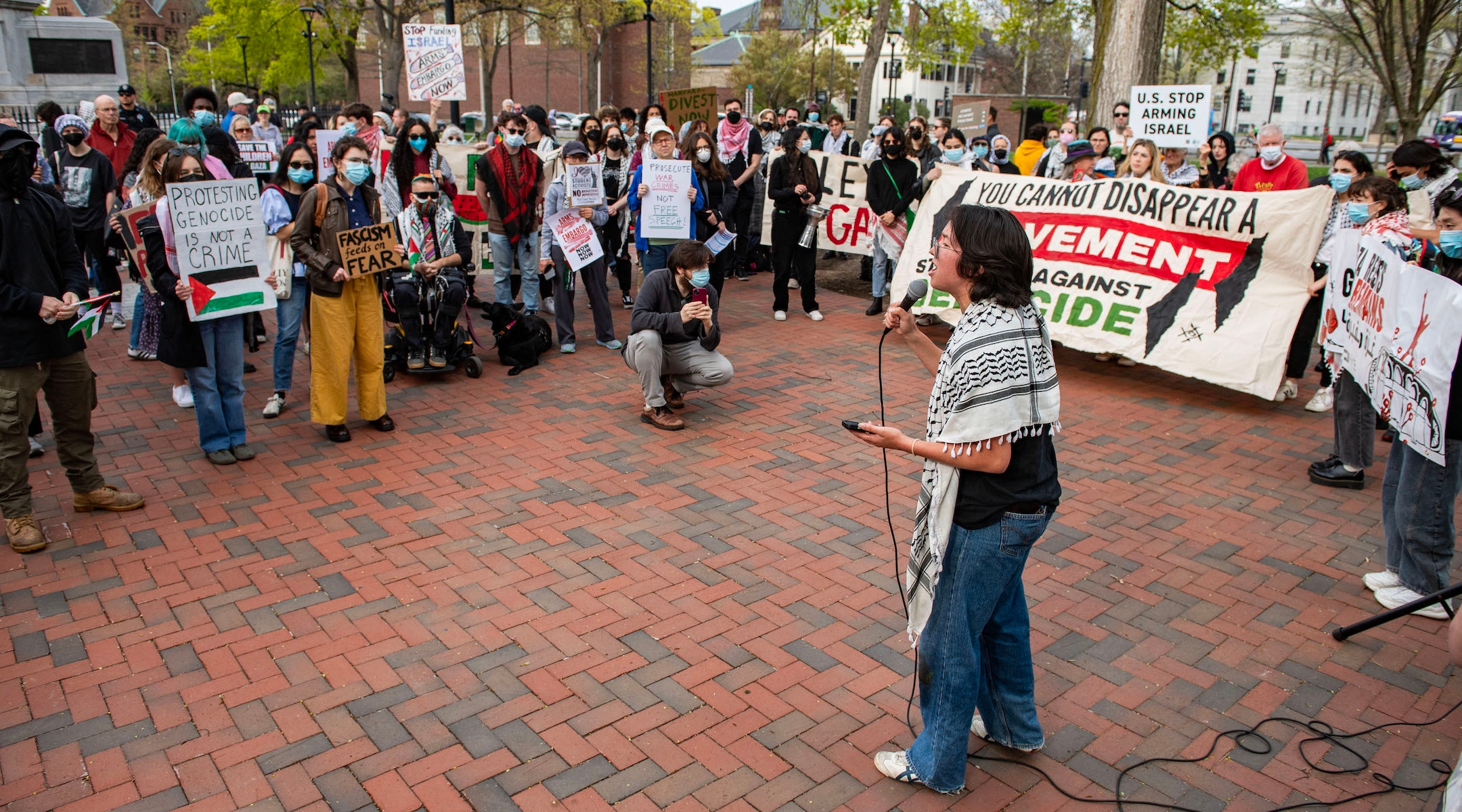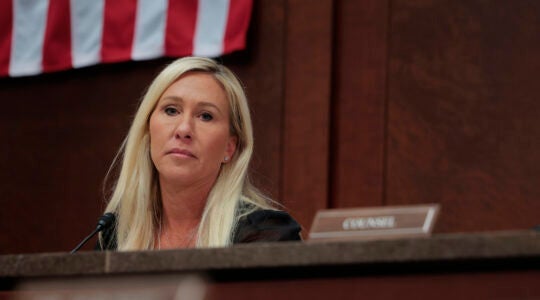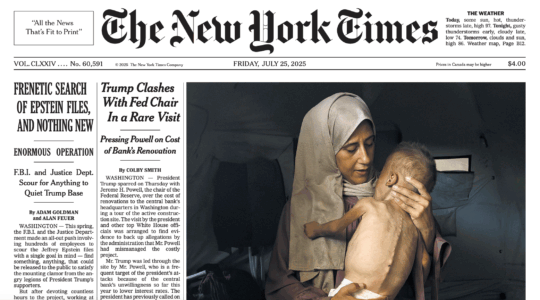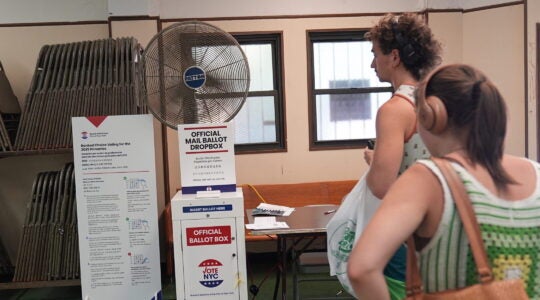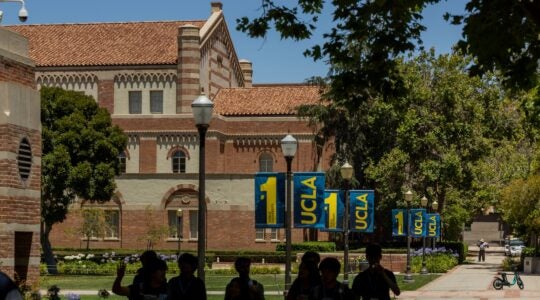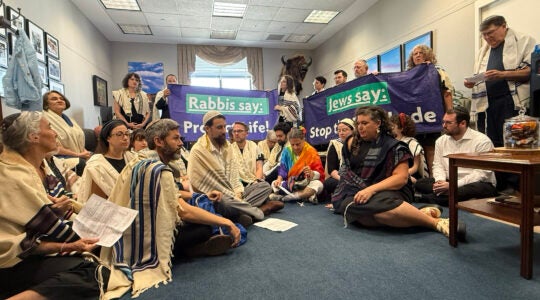Harvard University’s president has apologized for the campus climate over the last year and a half, in a letter accompanying a long-awaited report from a university task force on antisemitism and anti-Israel bias.
The task force found that Jewish and Israeli students at Harvard experienced pervasive “shunning” and were relentlessly targeted for their identities by both peers and faculty in the days and months after Hamas’ Oct. 7, 2023, attack on Israel, according to the report, released Tuesday.
“I am sorry for the moments when we failed to meet the high expectations we rightfully set for our community,” wrote President Alan Garber, who convened the task force. He continued, “Harvard cannot — and will not — abide bigotry.”
The 311-page report lands 16 months after the committee first formed — and days after the Trump administration publicly called for its release. The school also published a parallel report, authored by a task force Garber convened on Islamophobia and anti-Palestinian bias. The two groups jointly collected nearly 2,300 responses to a campus climate survey, with the antisemitism task force also conducting listening sessions with around 500 Jews on campus.
The detailed reports (the Islamophobia one runs 222 pages) arrive as the Ivy League school is locked in a fierce legal battle with the White House, which has pulled billions of dollars in federal funding to the university, citing its failure to manage antisemitism. In response, Harvard has sued the administration, which has also threatened to revoke the school’s tax-exempt status.
The school delayed the reports’ release amid the sparring, according to the Crimson, the student newspaper; a Harvard representative declined to comment on the reports’ timing to the Jewish Telegraphic Agency. Task force co-chair Derek Penslar, director of Harvard’s Jewish Studies program, also declined to comment.
Garber praised both reports’ release in an accompanying letter to the campus community, in which he promised to establish “a research project on antisemitism” as well as “support a comprehensive historical analysis of Muslims, Arabs, and Palestinians at Harvard.” He also pledged to review school disciplinary policies and find new ways to promote “viewpoint diversity.”
The antisemitism and anti-Israel task force report paints a sobering portrait of the campus climate for Jewish and Israeli students.
“No other group was constantly told that their history was a sham, that they or their co-religionists or co-ethnics were supremacists and oppressors, and that they had no right to the protections offered by anti-bias norms,” reads one section. “Many Jewish students told us they feel like objects of suspicion.”
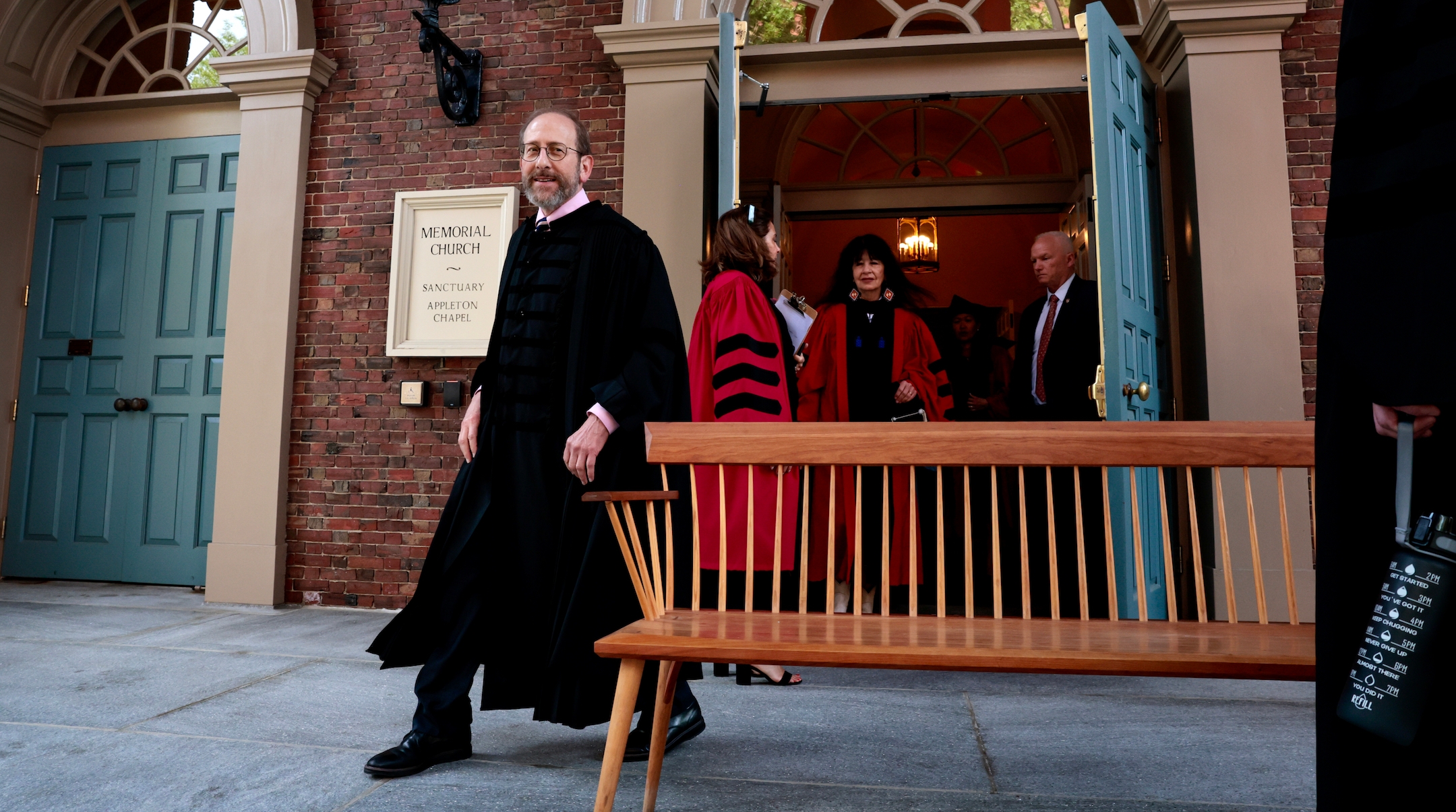
Then-interim president of Harvard University, Alan Garber, arrives for a photo with honorees before the 373rd Commencement at Harvard University. (Craig F. Walker/The Boston Globe via Getty Images)
The task force focuses only on the 2023-24 school year, a time period when Harvard became a central flashpoint of post-Oct. 7 campus controversies, and does not detail the school’s recent fights with Trump. Its authors, a mix of Harvard faculty, students and staff — as well as the director of Harvard Hillel for most of the period — urge the university to take a series of actions, going further than similar task force reports at other universities in advocating for wholesale change.
Those changes include more rigorous oversight of school centers, programs and courses on subjects such as the Israeli-Palestinian conflict to avoid “politicized instruction”; revamping admissions to prioritize students willing to do “bridge-building” and face “diverging viewpoints”; and expanding the school’s roster of classes on antisemitism, Judaism and the Israeli-Palestinian conflict.
The report opens with an anecdote of a Jewish student who was told by peers that they could not present their grandparents’ Holocaust survival narrative at a student forum, because the family had emigrated to Israel. “They told me my family history was inherently one-sided because it does not acknowledge the displacements of Palestinian populations,” the student recalled.
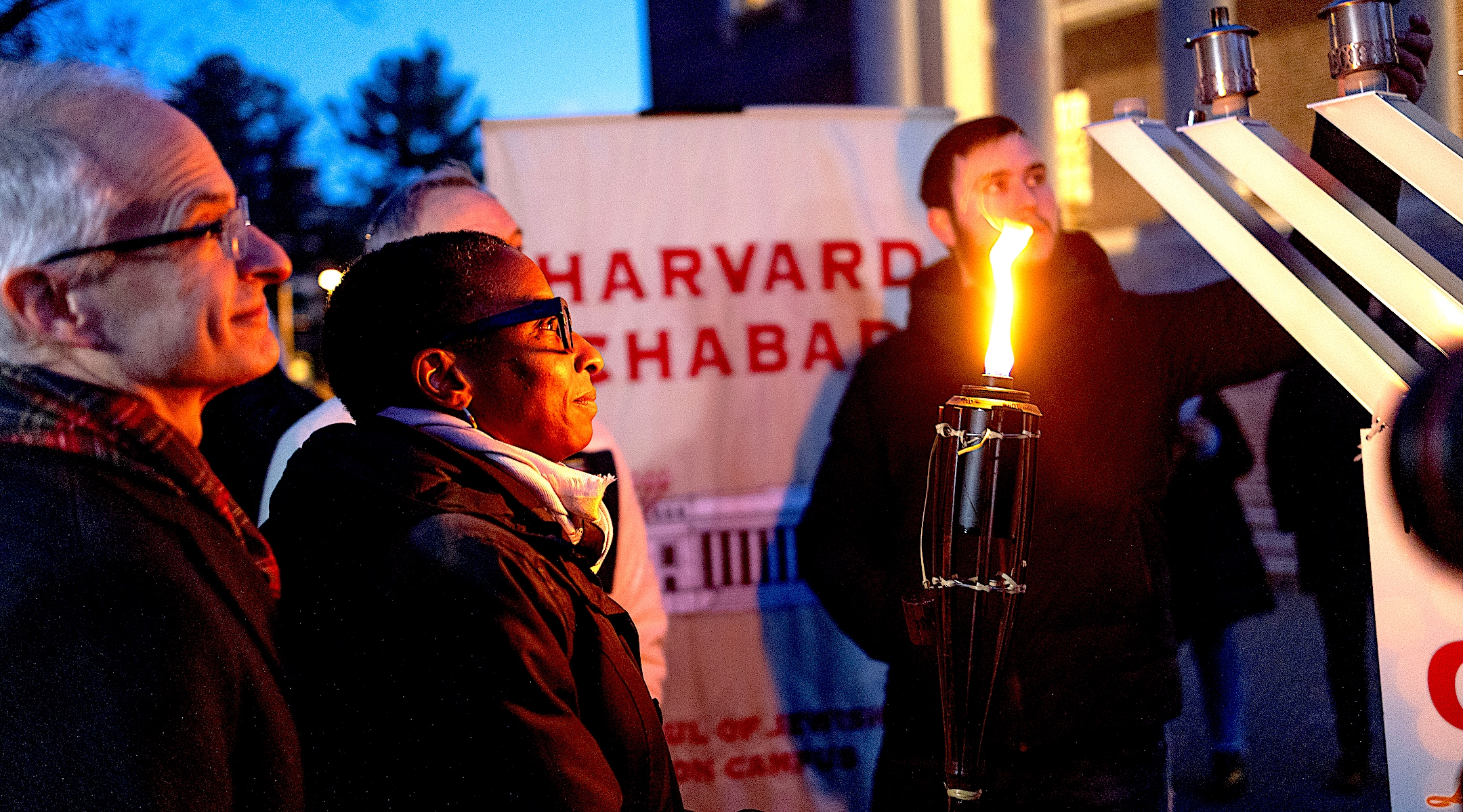
Harvard President Claudine Gay attends a menorah lighting ceremony on the seventh night of Hanukkah with the university’s Jewish community, Dec. 13, 2023. (Andrew Lichtenstein/Corbis via Getty Images)
The task force goes on to depict the post-Oct. 7 climate at Harvard as one that frequently sought to lay the blame for Israel’s actions in Gaza at the feet of the school’s Jewish and, especially, Israeli students — both inside and outside of the classroom. In the joint task force surveys, Jewish Harvard students were twice as likely as non-Jewish, non-Muslim peers to feel “unwelcome and unsafe” (though Muslim students reported “greater negative experiences” on campus than Jewish students).
And amid what the authors described as increased polarization and more aggressive campus protests than in generations past, they noted, “Harvard lacks relevant courses and programming to address the campus climate and discuss events in Israel/Palestine in a constructive, informed, and non-threatening way.”
One section of the report is devoted to the failures of staff and faculty at different Harvard schools to foster a welcoming environment for Jewish and Israeli students, including criticism of “politicized instruction that mainstreamed and normalized what many Jewish and Israeli students experience as antisemitism and anti-Israel bias.”
“We urge the university and its schools to take on the mantle of moral leadership in the fight against antisemitism and anti-Israel bias,” the report reads at one point. “We are deeply concerned that these forms of bigotry are becoming increasingly normalized in academia.”
The report also spends many pages setting up a broader historical context for the presence of Jews, antisemitism, and pro-Palestinian organizing on Harvard’s campus. The authors note the experiences of Harvard’s Jewish students following the end of its anti-Jewish quotas. They also document a shift over the last few decades from a brand of on-campus pro-Palestinian protest that sometimes sought to break bread with pro-Israel students, to one that focused on “shunning” them from public spaces and “appears to view bridge-building activities as a form of betrayal.”
A small number of anti-Zionist Jewish students also told the task force they felt discriminated against at Jewish organizations serving the campus, including Hillel and Chabad, due to their views on Israel.
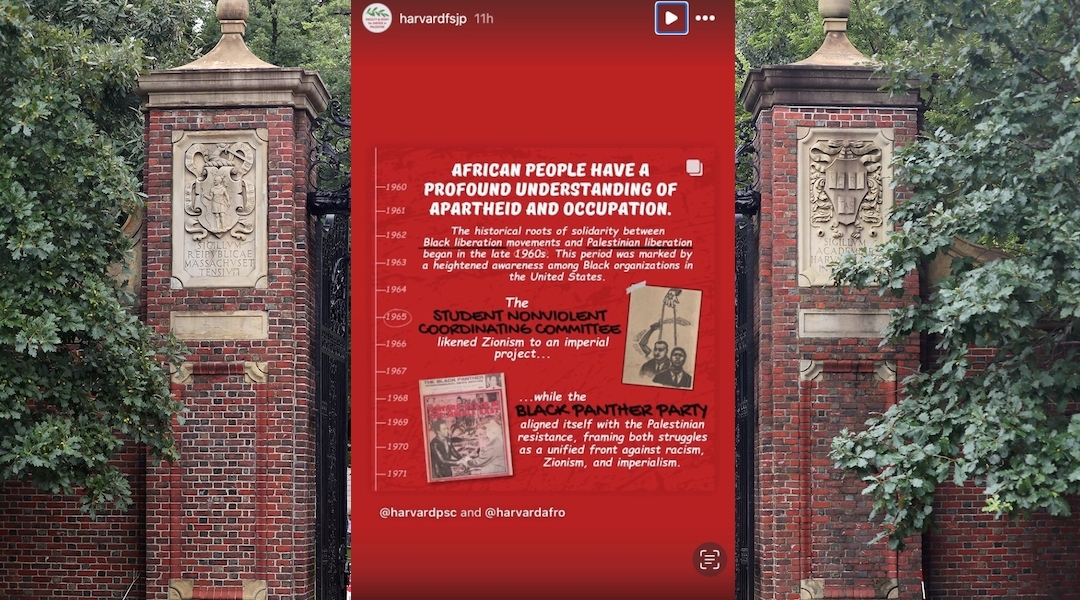
A February 2024 Instagram image reposted by Harvard Faculty and Staff for Justice in Palestine, since deleted, showing a cartoon with antisemitic imagery that originated in the Civil Rights Era. The post is depicted over an image of the Harvard Yard gates. (Image via X; David L. Ryan/The Boston Globe via Getty Images)
The parallel Islamophobia task force’s report, meanwhile, includes testimony from pro-Palestinian Jewish students. One who identifies as “a Jew with an Israeli parent” chastises Harvard for “bend[ing] over backwards to represent the views of the Zionist members of your community at the expense of those Jews in the diaspora who oppose the colonial project.”
The latter report also criticizes Harvard for not doing more to protect students from doxxing, including the presence of pro-Israel “doxxing trucks” that drove through campus projecting images of students the truck called “Harvard’s Leading Antisemites.”
Survey respondents for the Islamophobia report also said they felt “apprehension” when Harvard adopted the International Holocaust Remembrance Alliance’s definition of antisemitism, which includes some forms of Israel criticism, as part of a recent lawsuit settlement. Muslim and pro-Palestinian students feared the move would “suppress pro-Palestinian protest by conflating criticism of Israeli policies with antisemitism.”
Side by side, the two reports reflect an often yawning gulf in how their respective communities viewed both the current and historic campus climate. The Islamophobia report criticized Harvard for cancelling pro-Palestinian campus events, while the antisemitism report said that, historically, the school has prioritized pro-Palestinian voices and de-emphasized pro-Israel ones when programming events around the conflict.
Yet they also attempted to reach consensus, with a shared “Pluralism Subcommittee” issuing joint recommendations to address both problems, including one to establish an “institutional anchor for practices of pluralism on campus.”
JTA has documented Jewish history in real-time for over a century. Keep our journalism strong by joining us in supporting independent, award-winning reporting.
